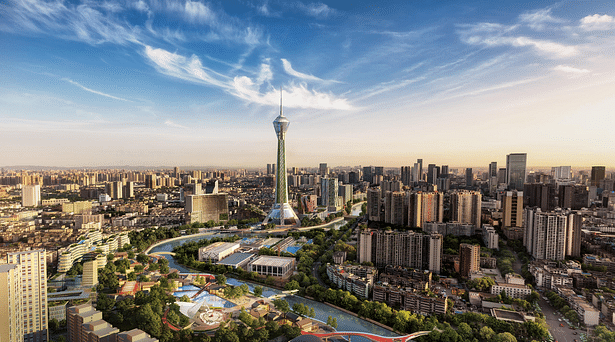
Hong Kong, HK | Shenzhen, CN | Shanghai, CN | Beijing, CN | Guangzhou, CN | Shenyang, CN | Chongqing, CN | Macau, CN | Singapore, SG | Dubai, UAE | Riyadh, SA | Manila, PH

LWK & Partners (HK) Ltd. (“LWK” or the “Company”) is glad to announce that the joint collaboration between LWK, Cistri Ltd (formerly known as Waters Economics Ltd) and Savills (Chengdu) Ltd has stood out from the rest in the international competition for the renewal of Chengdu’s Mengzhuiwan. Leveraging our combined strength in design, the proposal has successfully gained the highest score after rounds of adjudication to place first in the competition as Best Proposal.
Located in the southwest of Chenghua district, Chengdu, the project site has a site area of 1.62 million square metres. It is adjacent to the Shuijingfang streets of Jinjiang district, separated only by the Jinjiang River. Being the only key development area in the city east under the local government’s development plan, the site is connected to multiple major traffic roads in the area. It is also home to the highest tower in the west of China – the West Pearl Tower. Mr. Jason Ho, LWK’s Director of Planning & Urban Design who has had over 30 years of experience in the profession, has led the project to its success along with Mr. Fangming Gao, Director and Head of LWK Chongqing Studio, and their teams of professionals. Together with the irrevocable support from our international consultants, the proposed project finally emerged as a champion in the competition.
In drawing up the renewal plan, LWK’s design team carefully considered the local people and culture. Making reference to the history of Mengzhuiwan, the proposed planning can realise the project site’s potential, maximising room for development as well as revealing its true colours. The final design has three key ideas, namely the revitalisation of the aboriginal river culture, a human-scaled planning, and culture-oriented commercial development. The proposed planning will provide an overall enhancement to the area’s image, so as to connect the past, present and future of Chengdu.
The design concept was taken from Taibo, the eighth chapter in the Analects of Confucious, which says, “From The Book of Odes we receive impulses; from The Book of Rules, stability; from The Book of Music, refinement”. The growth of Chengdu’s creative industry is booming; the proposed planning leans on this strong foundation of performing arts and education to create a cultural and creative cluster and regional arts centre for Chenghua district. The proposed planning also takes into account the long term development of the area. LWK proposed for the core locations in the area to be renewed organically as the thematic melody, while the enhanced new overall image acts as accompaniment to the melody; long-term reconstruction can enrich the movement to complement the future city, and a symphony of urban renewal is written.
Out of respect for the local culture, history and art, any damage to the existing urban texture are avoided as a principle of the proposed planning. Instead, the plan proposed intensive integration of resources to give full play to the area’s existing advantages in the hopes of creating a brand new waterfront green lifestyle in the increasingly populated city. Based on different traits of the streets, the proposed planning divided the project site into four themed areas. Pedestrian network within the area was enhanced, while a more open view towards to river was also created to provide an overall transcendence in quality of life and user experience for residents and visitors.
Director of Planning & Urban Design of LWK, Mr Jason Ho, says, “A terrific urban planning should be more than a mere decoration to the city. It has to correspond with and complement its surrounding context to achieve a more sustainable development. Culture and development are two ends of a scale. Finding balance between the two and further its application is the way to find the ideal development plan. Mengzhuiwan possesses rich civic and cultural resources. It is the origin of Chengdu’s dreams and hopes. We look forward to its beautiful symphony, so that it can become ‘The River of Dreams’ for the local citizens.”
No Comments
Block this user
Are you sure you want to block this user and hide all related comments throughout the site?
Archinect
This is your first comment on Archinect. Your comment will be visible once approved.